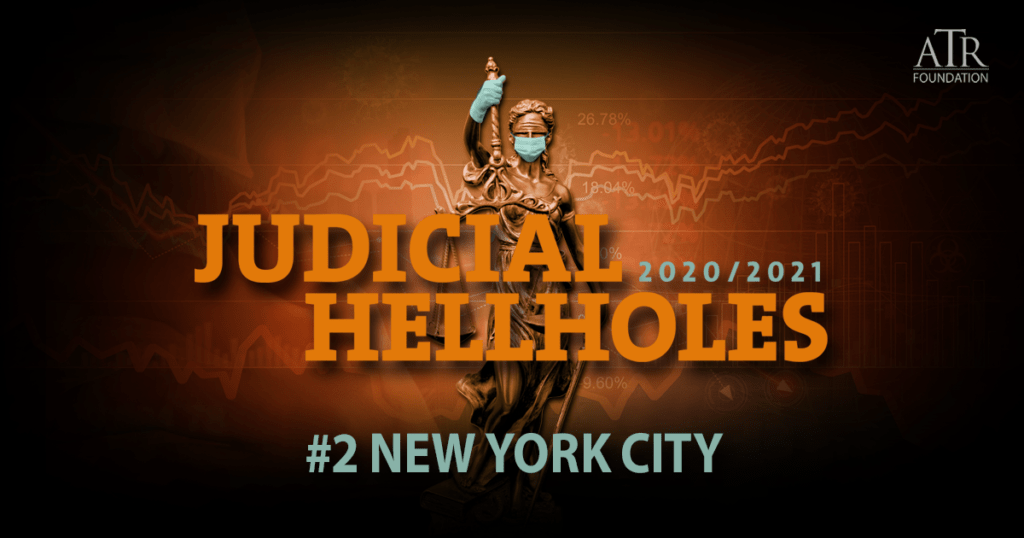‘Highly Unusual’ Rehearing of Louisiana Case Raises Judicial Independence Concerns
Louisiana Supreme Court Waffles Under Political Pressure, ATRA Brief Urges Court to Stand Strong

The New York trial bar may get yet another gift from the state lawmakers seemingly tied around their finger.
This piece was authored by ATRA President Tiger Joyce and was originally published on Medium.
New York’s legislature passed a bill to expand the state’s False Claims Act (FCA), a law originally intended to hold people and companies liable for defrauding governmental programs. The expansion would allow for private enforcement of the state’s tax laws, creating a system in which virtually anyone could act as a whistleblower in everyday tax issues — be it an accountant at a firm, an employee at a company, or anyone with knowledge about a personal or corporate filer’s tax statements. A whistleblower’s lawyer could then send the claim to the state attorney general, who would then determine whether the state also wants to join the litigation. This would, in effect, move routine tax disputes out of the oversight of tax experts and into the hands of trial lawyers incentivized by the prospects of large payouts.
Notably, Massachusetts Senator Elizabeth Warren introduced a similar bill at the federal level this spring, specifically targeting “misstatements” on tax forms of high earners. Should the New York bill be signed into law, it would set a dangerous precedent for the passage of Senator Warren’s federal bill.
In New York, the trial bar argues that this legislation will benefit taxpayers, increase state revenues, and reduce instances of fraud — but a closer look shows that is not the genuine intent. If they truly intended to reduce fraud, it would be far more beneficial to leave everyday tax disputes with the Tax Department rather than move them into state courts where the costs and delays of litigation likely will drive outcomes for taxpayers as much or more than the merits of a case. Moreover, under this legislation, complex tax issues would be evaluated and decided upon by judges who may have little or no tax law expertise.
Tax advisors and accountants routinely help their clients to decrease their tax obligations with defensible but aggressive tax mitigation measures. These reflect the professional judgment of accounting teams, but accounting experts work closely with tax departments to ensure compliance for their profession and for their clients.
To place tax disputes in the hands of trial lawyers would be a boon to them — not taxpayers. Trial lawyers will use their standard business model to capitalize on yet another opportunity created by expanding liability. These proposed amendments, coupled with the civil penalties and damage provisions under New York’s existing FCA, would incentivize trial attorneys to create a business model around suing wealthy tax filers and businesses in more significant numbers.
This has the very real potential to turn any disputable tax position into FCA litigation with attorneys’ fees, court costs, and discovery — matters currently handled with the Internal Revenue Service or the state tax departments.
Lawyers can be expected to target deep pockets rather than the most severe violations. This will turn tax compliance into a money-making operation instead of upholding legal compliance and the taxpayers’ interests. The net effect could well be for trial attorneys to seek to review the work of every accountant in New York who advises wealthy clients in search of a disputable tax position that could result in their next payday.
New York City is ranked the second worst “Judicial Hellhole®” in the country by the American Tort Reform Foundation, due in significant part to courts allowing for novel and expansive theories of liability. Expanding the state’s False Claims Act would only create yet another avenue for litigation in an already overly litigious state.
Federal passage could create an entirely new cottage industry for opportunistic trial lawyers across the country, wreaking economic havoc on communities still recovering from prolonged pandemic closures.
Allowing private enforcement of tax laws by trial lawyers looking for their next big payout is an improper expansion of New York’s false claims laws, and they won’t achieve their thinly veiled goal of reducing fraud. Trial lawyers are the ones who will come out ahead, while businesses and high-earning taxpayers will unnecessarily become targets for litigation.
Governor Cuomo should veto this bill, and if lawmakers truly want to reduce tax fraud, they should leave it up to their tax experts and investigators — not lawyers out to make a buck.
Tiger Joyce is president of the American Tort Reform Association.
Want more updates on civil justice reform? Sign up for ATRA’s occasional email updates.
Louisiana Supreme Court Waffles Under Political Pressure, ATRA Brief Urges Court to Stand Strong
Left unchecked, these jurisdictions will continue dragging down economic growth and undermining justice through rampant lawsuit abuse.
Claimants Given Opportunity to Vote on Plan; Judge to Reconsider Scientific Validity of Plaintiffs’ Experts
Legitimate consumer protection demands sound science and impartial analysis — not distorted data designed to manufacture lawsuits.
Law Firms Spent $168M+ on 2.2M Ads in Georgia
ATRA’s Latest Studies Reveal Financial Influence and Lack of Transparency in Pennsylvania’s Campaign Finance Systems